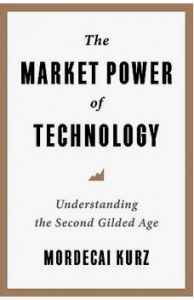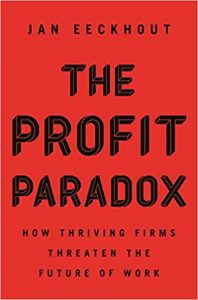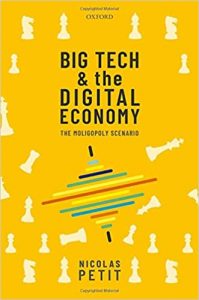I’ve been reading Mordecai Kurz’s The Market Power of Technology: Understanding the Second Gilded Age, in between more summer-holiday type books (half way through Paul Murray’s excellent The Bee Sting now). Kurz’s underlying argument is one I find plausible: Technical innovation by corporations (on a platform of publicly-funded basic scientific research) drivers growth, but corporations translate innovation into monopoly power and rents. Policy alternates between lax and tough competition enforcement, the latter limiting the period of monopoly power. In between, there have been gilded ages.
The book distinguishes the return to capital productively employed from wealth, the accumulation of those rents. It argues that “all intangible assets are just different forms of monopoly wealth” – clearest for IP assets that explicitly guarantee firms’ monoplies. The book argues for prevention of tech mergers, break-up of vertically integrated parts of big corporations, and limitations on the granting of patents and copyright. Tech-based market power cannot be avoided but it should be contained.
The book combines economic and business history with an extended formal model of Kurz’s approach (and this means it is probably not a book for the general reader). The formal modelling is actually the part I found least compelling – particularly in Chapter 5, which for example assumes the monopoly producer has a constant returns to scale production function. This chapter estimates that monopoly power led to delays of 12-15 years in the diffusion of electricity in the US, but – unless I missed a key step – the calculation seems not to take account of the impact of scale effects, which would shorten those estimates.
The previous chapter has an intriguing chart (4.9): the 50s-late 70s are reported as a period of high monopoly profits – like the 20s and the 2000s on – yet were obviously a period of strong productivity growth and rising living standards. Kurz explains these decades as not being designated a gilded age because policy ensured rising real wages and high employment. But actually if monopoly wealth brings about rapid growth through self-reinforcing technological innovation, it would be nice to have more of that. The policy lesson seems to be more about redistribution and labour market policies than about competition enforcement to limit the monopoly rents. The periods of low welath and low market power in this historical chart were periods of weak growth or worse.
I’d also like to have had more about countries other than the US, and indeed some other examples – is Walmart a tech monopoly? Or Nike? Few other countries span as much of the technology frontier as the US, so diffusion becomes the more important issue, and market power protected by IP and other tactics can be deployed anywhere. But wealth inequality is high in many countries – are all characterised by companies garnering monopoly rents and if so how?
Still, the book does set in a coherent theoretical framework the many recent books that have addressed the issue of market concentration and particularly big tech. It’s an interesting framing of current growth challenges, and one I broadly agree with. And Kurz’s call for tougher competition policy echoes many others. We will see whether it will translate into tougher enforcement and an ened to this second gilded age.





